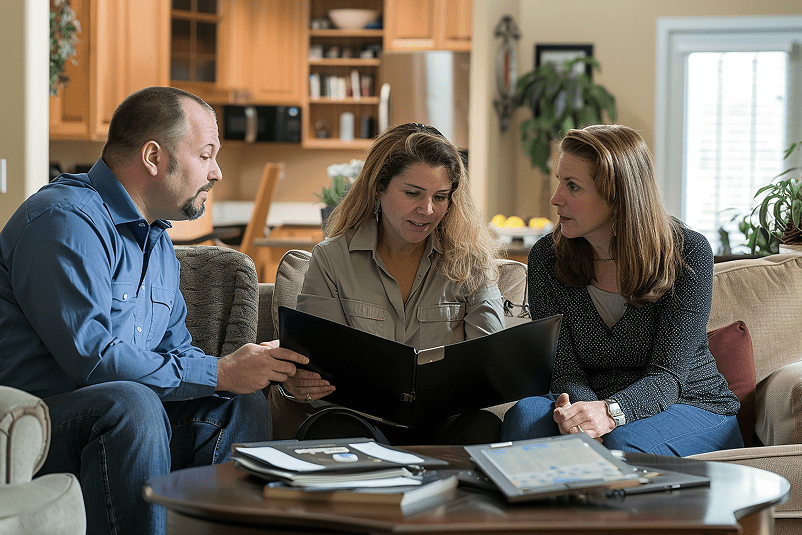Joint Mortgage with Bad Credit
Securing a joint mortgage with bad credit can seem challenging, but it’s not impossible. Many couples or co-applicants find themselves in situations where one or both have poor credit scores, raising concerns about whether they can successfully apply for a mortgage. The good news is that while having bad credit can limit your options, there are specialist lenders in the UK willing to offer joint mortgages to applicants with a less-than-perfect credit history.
In this article, we’ll discuss what lenders look for when assessing joint mortgage applications, how bad credit impacts your chances, and which lenders in the UK are open to working with applicants who have bad credit.
Introduction to Joint Mortgages
A joint mortgage is a type of mortgage that allows two or more people to share ownership of a property and split the mortgage payments. This type of mortgage is commonly used by couples, friends, or family members who want to purchase a property together.
When applying for a joint mortgage, lenders will consider the credit history and income of all applicants to determine the amount they can borrow and the interest rate they will be charged. It’s essential to understand how joint mortgages work and how bad credit can affect the application process. Key terms to consider include credit report, credit history, and joint mortgage application.
Understanding Bad Credit
Bad credit refers to a low credit score or a history of credit issues, such as missed payments, defaults, or county court judgments. Having bad credit can make it more challenging to get approved for a mortgage, as lenders view it as a higher risk.
However, it’s not impossible to get a mortgage with bad credit. Some lenders specialise in bad credit mortgages and may offer more flexible terms, such as higher interest rates or larger deposits. Understanding your credit report and credit score is crucial in determining the best course of action for your mortgage application.
What Is a Joint Mortgage?
A joint mortgage is a mortgage taken out by two or more people, typically a couple or business partners, to buy a property. Each person involved in the mortgage application is equally responsible for repaying the loan, and their combined income is used to determine the mortgage amount they can borrow.
The main benefit of a joint mortgage is the pooling of resources for a higher borrowing capacity. When applying for a joint mortgage, the lender will assess both applicants’ financial situations, including their credit scores, income, and overall affordability.
Applying as a sole applicant may allow an individual to secure a better deal since the partner’s credit won’t be considered, but it may also limit the borrowing amount.
How Does Bad Credit Affect a Joint Mortgage Application?
Bad credit can complicate a joint mortgage application. Lenders will typically look at the credit histories of all applicants, so if one or both applicants have a bad credit score, it can raise red flags.
Bad credit is usually a result of missed payments, defaults, County Court Judgments (CCJs), Individual Voluntary Arrangements (IVAs), Debt Management Plans (DMP) or even bankruptcy. Life events such as illness or separation can lead to missed or late bill payments, resulting in bad credit.
Here are some of the ways bad credit can impact your joint mortgage application:
- Higher Interest Rates: Lenders may view applicants with bad credit as higher risk and may offer a mortgage at a higher interest rate to offset that risk.
- Smaller Loan Amounts: If one applicant has bad credit, the lender may offer a smaller loan than you would receive if both applicants had good credit.
- Larger Deposit Requirement: Lenders may require a larger deposit, often around 15-30%, if one of the applicants has bad credit, to reduce their risk.
- Limited Lender Options: High street banks may decline your application, but specialist lenders are more likely to consider your circumstances.
- Credit Checks: All applicants must undergo credit checks, and lenders evaluate the joint credit profiles to assess the risk. The overall decision is often influenced by the weakest credit profile among the applicants
What Do Lenders Look for in Joint Mortgage Applications with Bad Credit?
When assessing a joint mortgage application, especially where bad credit is involved, lenders look at a range of factors to determine whether to approve the loan. Here’s a detailed explanation of what lenders evaluate:
1. Credit History of All Applicants
Lenders will check the credit reports of both applicants. If one person has poor credit history while the other has a strong credit profile, this might balance out the risk. However, the applicant with bad credit may affect the overall interest rates or mortgage terms.
Most lenders will assess the lower credit score in a joint application when one applicant has bad credit. A joint mortgage with one good credit rating and one bad credit applicant is more likely to be approved than if both applicants have poor credit.
2. Type and Severity of Credit Issues
Not all bad credit is treated equally. Some lenders may be more lenient with minor credit issues like a few missed payments, whereas more severe issues such as defaults, CCJ”s, or bankruptcy may require a longer waiting period before approval. Most credit issues disappear from a credit report after six years. Lenders will want to know:
- How long ago the bad credit occurred.
- What type of credit issue it was (e.g., missed payment vs. bankruptcy).
- Whether the credit issue has been resolved.
3. Income and Employment Status
Lenders will assess both applicants’ income to determine how much they can afford to borrow. If one applicant has bad credit but a high and stable income, it may offset the risk associated with their credit history. Stable employment with a consistent salary will increase the chances of approval, even if one of the applicants has bad credit.
4. Deposit Size
The larger your deposit, the less risk there is for the lender. Applicants with bad credit will often be asked for a larger deposit, typically 15-30%, to reduce the lender’s exposure to risk. A substantial deposit not only increases your chances of being approved but can also lead to better mortgage terms, such as lower interest rates.
5. Affordability Assessment
Lenders will carry out an affordability check to ensure that both applicants can afford the monthly repayments. This includes evaluating your income, outgoings, and existing debts. Even if one applicant has bad credit, a strong affordability profile for both applicants can help mitigate the risk.
6. Time Since Credit Issues
The age of your credit problems matters. Lenders will generally be more flexible if your bad credit events happened several years ago, and your financial situation has since improved.
For instance, some lenders are willing to offer mortgages to applicants whose defaults or CCJs occurred more than three years ago, especially if they’ve had no further credit issues. Lenders may only consider the most recent six years of credit history during the mortgage assessment.
Benefits of Joint Mortgages
One of the primary benefits of a joint mortgage is that it allows multiple people to pool their resources and purchase a property that they may not have been able to afford individually. Joint mortgages can also provide a sense of security and stability, as all applicants are equally responsible for the mortgage payments.
Additionally, joint mortgages can be beneficial for couples or partners who want to build a life together and create a stable financial future. However, it’s essential to consider the potential risks and challenges associated with joint mortgages, such as the impact of bad credit on the application process. Key terms to consider include combined income, property price, and joint mortgage application.
Which Lenders Offer Joint Mortgages with Bad Credit?
While most mainstream lenders may be reluctant to approve a joint mortgage with bad credit, this will depend on the amount and the registered date of adverse credit. There are several specialist lenders that cater to applicants with credit problems. These lenders have more flexible criteria and are willing to assess applicants on a case-by-case basis. Below are some lenders that may consider offering a joint mortgage to borrowers with bad credit:
| Lender Name | Description |
|---|---|
| Aldermore | Offers mortgages to borrowers with complex credit histories, including bad credit. Considers affordability and financial stability for joint mortgages. |
| Precise Mortgages | Specialises in adverse credit cases like defaults, CCJs, and IVAs. Flexible with bad credit histories, especially if issues are older and finances rebuilt. |
| Kensington Mortgages | Focuses on applicants with non-standard credit profiles. Offers competitive rates for those with larger deposits and good affordability. |
| The Mortgage Lender | Provides products for applicants with bad credit histories including missed payments, defaults, and CCJs. Assesses applications individually. |
| Bluestone Mortgages | Specialises in bad credit mortgages, including joint mortgages. More likely to approve with steady income and significant deposit. |
If your bad credit is historical there could be a chance that a specialist broker maybe able to approach a high street lender. This will allow a smaller deposit and better interest rates.
Steps to Improve Your Chances of Securing a Joint Mortgage with Bad Credit
If you’re applying for a joint mortgage with bad credit, there are several steps you can take to improve your chances of approval:
1. Improve Your Credit Score
If possible, work on improving your credit score before applying for a mortgage. Pay off any outstanding debts, avoid missing payments, and reduce your credit card balances to show lenders that you’re improving your financial management.
2. Save for a Larger Deposit
The larger your deposit, the more attractive you’ll be to lenders. A bigger deposit reduces the lender’s risk and may help you secure a mortgage with more favourable terms, even if one applicant has bad credit.
3. Consider a Specialist Mortgage Broker
A specialist mortgage broker can help you find lenders that are more likely to approve joint mortgage applications with bad credit. Brokers have access to a wider range of lenders, including those who may not be available directly to borrowers.
4. Maintain Financial Stability
Ensure that both applicants have a steady income and manage their finances responsibly. This demonstrates to lenders that you’re capable of meeting your mortgage payments, even if one of you has a bad credit history.
Conclusion
While securing a joint mortgage with bad credit can be more challenging, it’s certainly not impossible. Specialist lenders such as Aldermore, Precise Mortgages, and Kensington Mortgages, are willing to consider applicants with bad credit, provided they meet certain criteria like a larger deposit and stable income.
By taking steps to improve your credit score, saving for a bigger deposit, and working with a specialist broker, you can increase your chances of finding the right mortgage and getting on the property ladder.
Get help from an experienced mortgage broker.
You can speak to one of our specialist mortgage brokers who would be able to guide you through the process. They will advise if there is a lender available and the maximum loan amount based on your circumstances. We are a whole of market mortgage brokerage with access to all lenders. Call us on 01332 470400 or complete the form with your details for us to give you a call back.
What our customers say
Marlon
25 Apr 2025
Showing our favourite reviews

Always attentive, helpful and efficient
Jonathan, 27 Jan 2025

Best Mortgage Broker in the UK!
Liam, 26 Nov 2024

Ben was really helpful in helping me…
George, 28 Aug 2024
FAQs
Can I get a joint mortgage if one of us has bad credit?
Yes, it’s possible. While some high street lenders may decline the application, many specialist lenders will consider joint mortgage applications where one applicant has bad credit—especially if the other applicant has good credit, a stable income, and there’s a strong affordability case.
Will bad credit mean we have to pay a higher interest rate?
Potentially, yes. Lenders may charge higher interest rates to offset the perceived risk if one applicant has poor credit. However, a larger deposit, strong income, or a co-applicant with good credit can help secure a more competitive deal—especially through a broker who understands lender criteria.
How much deposit do we need for a joint mortgage with bad credit?
Most applicants with bad credit are asked to provide a deposit of 15–30%, depending on the severity and age of the credit issues. The bigger the deposit, the more likely lenders are to approve the application and offer better terms.
Will lenders check both credit scores in a joint application?
Yes. All applicants’ credit histories are reviewed. If one person has bad credit, it can affect the overall decision—but some lenders will still approve the application if the other applicant has a clean record and there’s strong evidence of affordability and financial stability.
How can we improve our chances of getting approved?
To strengthen your joint mortgage application:
- Check both credit reports and resolve any errors
- Pay down existing debts and avoid new credit applications
- Save for a larger deposit
- Work with a specialist mortgage broker like Option Finance
- Demonstrate stable employment and consistent income
Ready to Take the First Step?
Whether you’re a first-time buyer, remortgaging, or moving home, bad credit doesn’t have to hold you back.
Understanding credit scoring can help you prepare for a mortgage application. You can speak to one of our specialist mortgage brokers who would be able to guide you through the process. They will advise if there is a lender available and the maximum loan amount based on your circumstances. We are a whole of market mortgage brokerage with access to all lenders.































